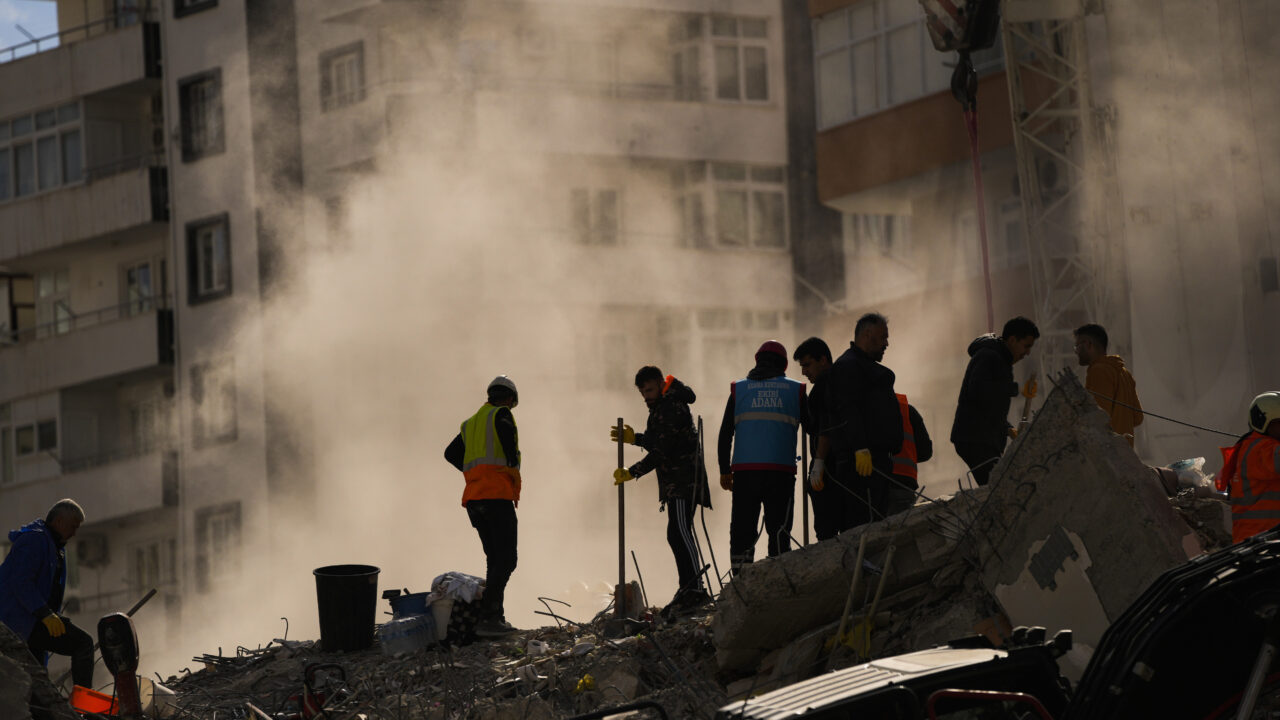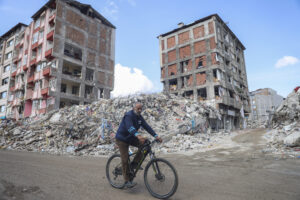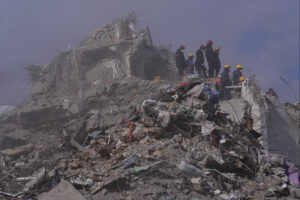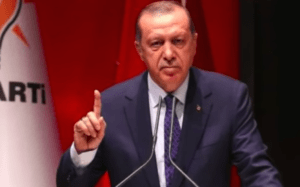Will Earthquake Aid for Syria Be Impeded by US Sanctions?
Many countries are already disregarding U.S. strictures against dealing with the Damascus government. Emergency team members search for people in a destroyed building in Adana, Turkey. Photo: Francisco Seco / AP.
Emergency team members search for people in a destroyed building in Adana, Turkey. Photo: Francisco Seco / AP.
A 7.8 earthquake that struck south-central Turkey and northwest Syria early on Monday morning. Although over two thousand are being reported dead in Turkey at midnight on Monday and more than a thousand in Syria, the death toll will grow a great deal as the rubble is combed by rescue workers. The BBC reports that tens of thousands may be dead. That it is cold at this time of year will make it harder for those trapped to survive. Some 19,000 are reportedly injured as of this writing.
The initial jolt was followed by several aftershocks, the first of them almost as powerful as the first quake, and the Turkey-Arabian fault slipped many miles.
This map from The Watchers gives a sense of the millions who felt the earthquake to some degree. The epicenter was near Gaziantep.
Those on the Syria side of the border faced special difficulties. The long years of Civil War had damaged the foundations of many buildings in northern Syria, making it easy for the earthquake to knock them down. That people were still asleep when it hit ensured a big death toll.
The earthquake hit the northwest Idlib province, where some 4.5 million people live, most of them Sunni Arab refugees from the Syrian Civil War that ensued after the Arab Spring youth protests of 2011. It also hit Latakia Province on the Mediterranean, which has a big Alawi Shiite population and is in the hands of the Syrian government of Bashar al-Assad.
In the port of Latakia, residents worried about a rumored tsunami, which, however, is not a real concern. The earthquake was so devastating because its epicenter was relatively shallow, and it was squarely in central Anatolia on land.
It should be noted that in response to the earthquake tragedy, many US partners in the Middle East are throwing caution to the winds and disregarding US strictures against dealing with the Damascus government.
The Syrian Civil War ended in a fragile and incomplete victory for the central government of Damascus and its Baath Party. Not only Idlib but also the northeast and eastern Kurdish regions remain beyond government control. Turkey allows aid into Idlib from the north. Some 90% of the Syrian population now lives below the poverty line.
Steven Simon and Josh Landis have argued that US sanctions, and especially those imposed by Trump, have the effect of interfering with the rebuilding of the country and are too broad-gauge. While sanctions have been applied to over 200 regime individuals under the 2019 Caesar Act, the US sanctions also threaten anyone who deals with the al-Assad government. Since you can’t rebuild destroyed buildings in Syria proper without dealing with the government, the effect is to keep Syrians miserable and unable to rebuild. This effect will be all the more devastating in the wake of the earthquake.
It should be noted that in response to the earthquake tragedy, many US partners in the Middle East are throwing caution to the winds and disregarding US strictures against dealing with the Damascus government.
Prime Minister Mohammad Shia al-Sudani of Iraq, who is close to that country’s Iran-backed militias, flew out 70 tons of aid to Damascus airport on Monday. Al-Sudani pledged an ongoing air corridor to bring in foodstuffs, medicine and fuel.
If Turkey and Syria cooperate in facing the earthquake disaster, that could draw a long period of mutual boycotts to an end.
Iran has been a close ally of Damascus and Tehran almost certainly asked al-Sudani to help in this way. Iraq is flush with oil money given the high prices of the past year. In contrast, Iran is under heavy US sanctions and even started charging much higher prices for its oil sales to Syria. Iraq is also dispatching 40 Civil Defense experts to help Syria with recovery from the earthquake.
At the same time, the United Arab Emirates sent $13.6 million in aid to Syria. Mohammed Bin Zayed, the Emirate ruler, called Syrian dictator Bashar al-Assad on the phone to express his condolences and his country’s willingness to help. Mohammed Bin Rashed Al Maktum, the ruler of Dubai, also sent aid to Syria.
The UAE has reopened its embassy in Damascus, and was scolded by the US for its steps toward normalizing relations with the al-Assad government. Iran, Lebanon and Egypt also expressed a willingness to help Syria. Prime Minister Binyamin Netanyahu said that he received a Syrian request for aid and was willing to offer it. Damascus, however, is denying that any such request was sent.
As for Turkey, it had been moving toward reconciliation with the al-Assad government, something the Russians say they are willing to help with. If Turkey and Syria cooperate in facing the earthquake disaster, that could draw a long period of mutual boycotts to an end.
Whether the US likes it or not.
Your support matters…Independent journalism is under threat and overshadowed by heavily funded mainstream media.
You can help level the playing field. Become a member.
Your tax-deductible contribution keeps us digging beneath the headlines to give you thought-provoking, investigative reporting and analysis that unearths what's really happening- without compromise.
Give today to support our courageous, independent journalists.






You need to be a supporter to comment.
There are currently no responses to this article.
Be the first to respond.